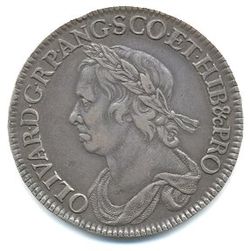- Et cetera
-
For the manga series, see Et Cetera."Etc." redirects here. For other uses, see ETC (disambiguation)."Etcetera" redirects here. For other uses, see Etcetera (disambiguation).
 The &c (et ceterarum, "Protector of England, Scotland and Ireland and of others") shows that Oliver Cromwell did not renounce the English claims on France.
The &c (et ceterarum, "Protector of England, Scotland and Ireland and of others") shows that Oliver Cromwell did not renounce the English claims on France.
Et cetera (in English, /ɛtˈsɛtərə/ or /ɛtˈsɛdərə/; Latin pronunciation: [ɛt ˈkeːtɛra]) is a Latin expression that means "and other things", or "and so forth". It is taken directly from the Latin expression which literally means "and the rest (of such things)" and is a loan-translation of the Greek "καὶ τὰ ἕτερα" (kai ta hetera; "and the other things". The more usual Greek form is "καὶ τὰ λοιπά": "and the remainder"). Et means "and"; cētera means "the rest".
Contents
Spellings and usages etc.
The one-word spelling "etcetera" is commonly used and is accepted as correct by many dictionaries. It is also sometimes spelled et caetera, et coetera or et cœtera and is often abbreviated to etc. or &c.. Archaic abbreviations, most commonly used in legislation, notations for mathematics or qualifications, include &/c., &e., &ct., and &ca.. Note that the ampersand is a ligature of "et".
The phrase et cetera is often used to delete the logical continuation of some sort of series of descriptions. For example, in the following expression...
- We will need a lot of bread: wheat, granary, wholemeal, etc.
... the "etc." stands for "and other types of bread". It is an error to say or write "and etc." in which the word "and" would be redundant. This would translate as "and and the rest".
Typically, the abbreviated versions should always be followed by a full stop (period), and it is customary—even in British English where the serial comma is typically not used—that "etc." always be preceded by a comma. Thus:
- A, B, C, etc.
not:
- A, B, C etc
At the end of a list ", et cetera" or ", etc." may be indicated by "..." as in:
- We need a lot of fruit: apples, bananas, oranges... for the luncheon.
At the end of a sentence it should be followed by a period as in ", et cetera." or ", etc." or indicated by three periods (an ellipsis) as in:
- We need a lot of fruit: apples, bananas, oranges...
Some publishing house styles[who?] (particularly in Britain) no longer require either the preceding comma or the following stop.[citation needed] In general, writers are advised to use the traditional style unless circumstances dictate otherwise.
Some pickier editors consider that “and the rest” implies a finite list thus distinguishing “etc.” from “and the like”, “and so forth” and so on. “Apples, bananas, oranges and so on” would be preferred to “apples, bananas, oranges, etc." unless the greengrocer supplies a list of available fruit.
Pronunciation Error
It is often mispronounced as "ex cetera", and subsequently abbreviated as "ect".
Usage by monarchs
European monarchs, who sometimes have lengthy titles due to dynastic claims to territories accumulated over the centuries (and also as a matter of prestige), often shorten their full titles by concluding it with "et cetera"; even then the phrase would often be repeated in order to emphasize the monarchs' grandeur.
A prime example of this usage would be from Tsar Nicholas II of Russia, who traditionally began his proclamations with his shortened (but still long) title: "We, Nicholas II, By the Grace of God, Emperor and Autocrat of All the Russias, King of Poland, Grand Duke of Finland, et cetera, et cetera, et cetera".
In the 1956 film The King and I, Yul Brynner, who played King Mongkut of Siam, repeatedly used the phrase "et cetera, et cetera, et cetera" to characterize the King as wanting to impress with his great knowledge of many things and his importance in not having to detail them.[1] This was based upon the usage in the book Anna and the King of Siam which related the real king's playful interest in numerous things, with the phrase, "&c, &c".[1]
Similar Latin expressions
- In lists of persons, et alii (abbreviated as et al., meaning "and others") is used in place of etc.
- In lists of places, et alibi may be used, which is also abbreviated et al. et alibi means "and elsewhere."
- In literature references, et sequentes (abbreviated et seq.) is used to indicate that only the first portion of a reference is given explicitly, with broad reference to the following passages which logically follow in sequence to the explicit reference. Hence "Title VII, Section 4, Subsection A, Paragraph 1, et seq." might refer to many subsections or paragraphs which follow Paragraph 1. Legal briefs and legislative documents make heavy use of et seq.
In Other Languages
- Spanish- etcétera
- French- et caetera
- Italian- eccetera (pronounced eh-CHE-tera)
- German- und so weiter
- Dutch- enzovoort
See also
- Ellipses (…) may be used for a similar function.
- List of Latin phrases
References
- ^ a b Maryann Overstreet (1999), Whales, candlelight, and stuff like that, p. 130, ISBN 9780195125740, http://books.google.com/?id=iqvJBmQWuJ8C&pg=PA130
Categories:- Latin words and phrases
Wikimedia Foundation. 2010.
